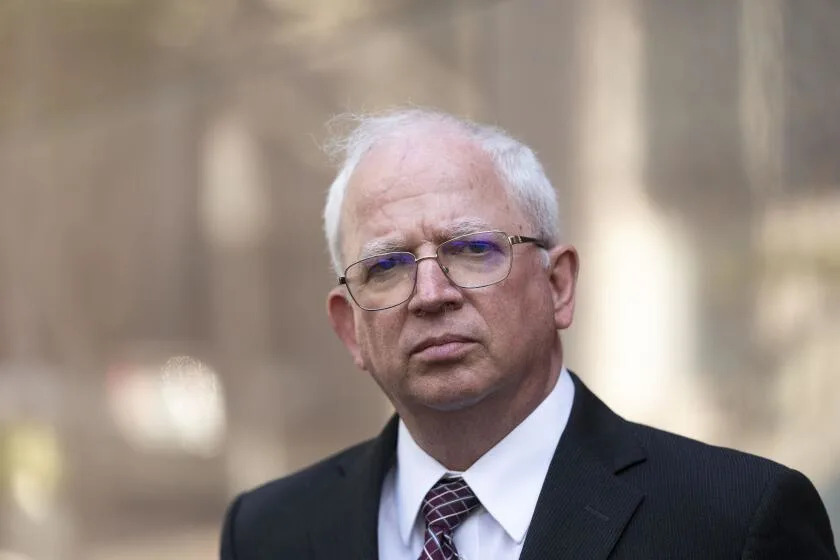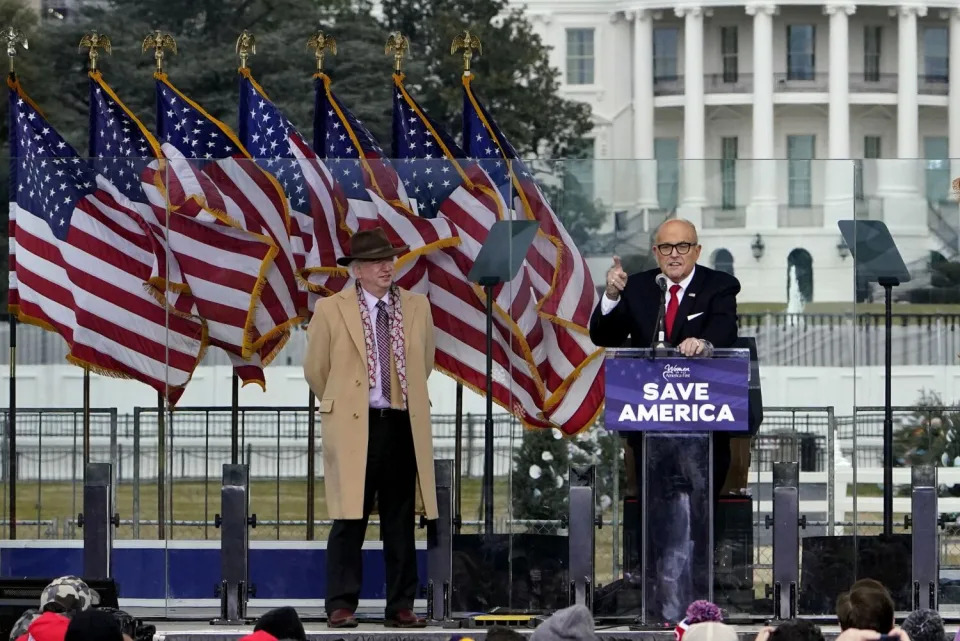
John Eastman, the former Orange County law school dean who helped forge Donald Trump’s legal strategy for retaining power after losing his 2020 presidential bid, should be disbarred, a State Bar Court judge ruled Wednesday.
Judge Yvette Roland’s recommendation to yank the 63-year-old Eastman’s license to practice law in California will go to the state Supreme Court, which has the power to approve it.
In a marathon trial that lasted off and on from June to November, the State Bar, the agency that regulates lawyers, argued that Eastman was unfit to practice law for peddling bogus claims that fraud cost Trump the election and for promoting a fake-elector scheme to block the electoral count.
Eastman claimed he was acting in good faith, and as a vigorous champion of his client. But State Bar attorneys argued “the evidence, including his often not-credible trial testimony, shows that he held — and still holds — truth and democracy in contempt, deliberately disregarding facts that demonstrate the validity of Biden’s victory to further a false narrative that would ignore the Constitution, disenfranchise millions of voters, and undermine a democratic election for President of the United States in favor of his allegiance to Trump.”
Rather than conduct honest research, Eastman “purposely parroted the misguided opinions and narratives of demonstrably unqualified, unvetted, and unreliable ‘experts,’” bar attorneys argued.
When Eastman urged the Georgia Senate to scuttle the popular vote for Biden and pick Trump electors, he claimed there had been rampant fraud in the state, including evidence of illegal votes from “as many as 2,500” incarcerated felons. The state would determine that only up to 74 potential felons had voted. The bar argued that Eastman knew or “was willfully blind” to the falsity of the numbers he peddled, and relied on an affidavit from an accountant with no expertise in statistics or elections.
Eastman sought “to fabricate an illusion of legality to an illegal effort to delay the formal recognition of Trump’s obvious defeat by any means possible.”
In the months after Biden won the presidency, courts repeatedly threw out Trump’s election challenges, the attorney general dismissed election-tilting fraud, and Eastman’s own emails, as late as Jan. 2, 2021, showed his awareness that “hard documented evidence of the fraud” was lacking.
Yet Eastman’s memos, presented at the bar trial, laid out a strategy in which Vice President Mike Pence would block the certification of Biden’s victory on Jan. 6 by refusing to count electoral votes in swing states.
Eastman knew that his plan was illegal, the bar argued, as shown by his opposition in December 2020 to filing a federal lawsuit testing his theory of Pence’s power to reject electors. “The risk of getting a court ruling that Pence has no authority to reject the Biden-certified ballots,” he wrote, was “very high.” It was better for Pence “just to act boldly and be challenged,” Eastman wrote.
Eastman promoted the “lawless theory” that Pence could reject electors, the bar argued, hoping to “extend the window for further mischief.” Eastman “has not accepted an iota of responsibility for his misconduct,” and showed a “complete and total lack of remorse,” instead portraying himself as a victim of political persecution.
Eastman’s misconduct “strikes at the very heart of what it means to be a lawyer — he misused his license in a grave and injurious manner designed to undermine our democracy,” the bar argued.
During the bar trial, which took place in a downtown Los Angeles courtroom, bar attorneys called election officials from contested states such as Arizona, Pennsylvania and Nevada to detail steps they took to ensure a fair election. Eastman’s legal team tried to show that illegalities marred the contest, but at times, his own witnesses appeared to undermine his case.
Testifying in Eastman’s defense was Michael Gableman, a former Wisconsin Supreme Court justice who has stated the election was stolen. But at the trial, Gableman admitted that his own 14-month probe into the election failed to prove that fraud cost Trump the election.
Another Eastman witness, John Yoo, his longtime friend and a Berkeley Law professor, testified that Joe Biden had won the White House “fair and square” and that Pence had “unassailable grounds” in refusing to reject electoral votes.
One of the bar’s star witnesses was Pence’s former attorney, Gregory Jacob, who said that Eastman approached him to argue that Pence could unilaterally toss out electoral votes in contested states where fraud was alleged. Pence rejected the idea, and Jacob accused Eastman of serving as “a serpent in the ear of the president of the United States.”
Eastman, the former dean of Chapman University’s law school, still has a license to practice law in Washington, D.C. He has been indicted, along with Trump and 17 others, in Fulton County, Ga., for election-related schemes. Eastman has vowed to fight the charges. Four of his co-defendants — including attorneys Jenna Ellis, Kenneth Chesebro and Sidney Powell — have pleaded guilty.

Eastman, a resident of New Mexico, is also an unindicted co-conspirator in the federal election interference case brought by special counsel Jack Smith. Eastman repeatedly invoked his 5th Amendment right against self-incrimination when he appeared before the House Jan. 6 committee, which recommended that the Department of Justice consider prosecuting him. U.S. District Judge David O. Carter ruled that Eastman “more likely than not” broke the law in connection with the 2020 election.
All along, Eastman’s defense has been that he was performing his duty as a vigorous legal advocate for Trump, advancing his legal theories in good faith, with a subjective belief in their merit. His defense attorneys argued that his public statements were protected by the 1st Amendment.
“If Dr. Eastman and his client were correct that the 2020 election was stolen — a view they firmly held at the time and continue to hold — then the threat to our system of government is extraordinarily high,” his lawyers wrote in his closing brief.
The State Bar maintained that Eastman’s remarks at the Ellipse park, on stage with Giuliani, helped fuel the mayhem that followed soon after at the U.S. Capitol. Eastman argued that he was not calling for violence.
“The State Bar offered no circumstantial evidence, let alone direct evidence, that Dr. Eastman intended that any individual would view or hear his statements and then commit acts of violence or lawlessness,” Eastman’s lawyers argued. “The plain text of Dr. Eastman’s statements at the Ellipse demonstrates they were clearly not even remotely a call for violence or could even be generously interpreted as calling for violence.”
Eastman, a former clerk for U.S. Supreme Court Justice Clarence Thomas, served as the dean of Chapman’s law school from 2007 to 2010. He remained a professor there until 2021, when an outcry against his election-related activity forced his departure.
According to his GiveSendGo page, Eastman has raised $636,602, with a goal of $750,000. In an interview with The Times, Eastman said that he expects his legal bills — from the bar trial, the Georgia indictment and other election-related trouble — will cost him $3 million to $3.5 million. He said recently that he had no regrets.
“Absolutely not,” he said. “Absolutely not.”
He said the bar trial was “extraordinary and unprecedented” but gave him a chance to present wider evidence of election fraud than had been previously aired. “It was eye-opening for a lot of people about the amount of illegality that we exposed during that trial,” Eastman said.
Eastman portrays himself as a battling patriot who has been subjected to “false narratives and calumnies.” He said he is the victim of “lawfare,” an attempt to silence unpopular views with legal machinery.
“We are in a rather significant fight, and for whatever reason, I am the lead point of the spear in that fight, and I am taking it on, as I think my duty as a citizen requires,” he said. “We’ll do what it takes.”
Despite his legal problems, Eastman has continued to speak publicly about the election. He recently got a warm welcome at a luncheon meeting of the East Valley Republican Women Patriots at the Agua Caliente Casino in Rancho Mirage.
“They had over 400 people show up,” he said. There was “overwhelming support and [a] standing ovation.”
This story originally appeared in Los Angeles Times









